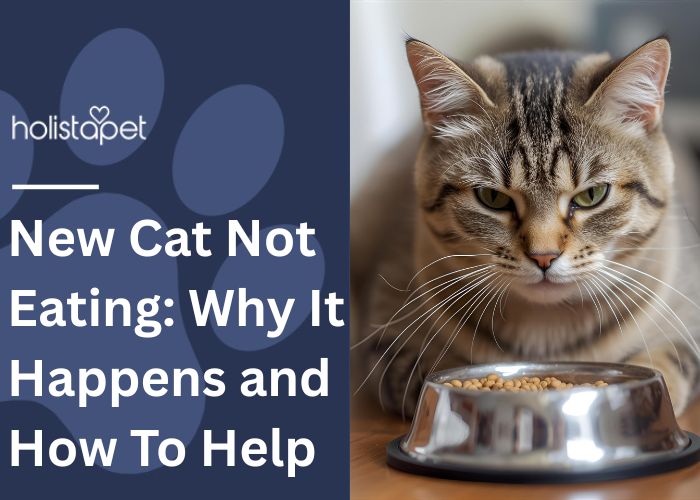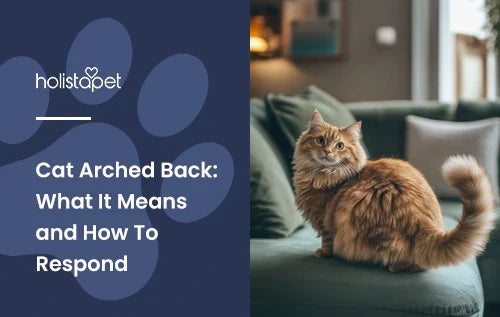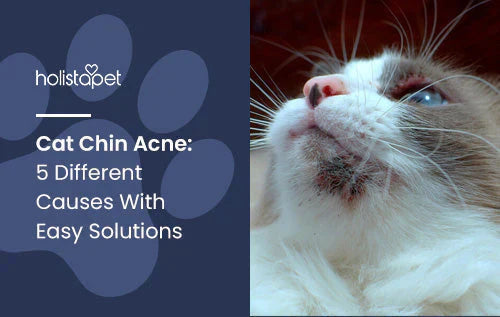Bringing home a new kitty feels exciting until you notice your furry friend isn't touching their meals. A new cat not eating in the first few days is common, and it can make any pet parent worry.
Bringing a new pet home can be overwhelming for them, often leading to a temporary loss of appetite. By maintaining a quiet space and offering patient, gentle care, you’ll help your new companion feel comfortable enough to start eating again.
Understanding Why Your New Cat Isn't Eating

It's pretty normal for a new cat to skip meals after arriving home. The change in surroundings, new faces, and different smells can make them nervous. Most eat less during the first few days while figuring out their new routine. This short adjustment period usually passes once they feel secure.
However, a decreased appetite that lasts more than a couple of days may mean your cat feels unwell. If your pet keeps avoiding food or acts sluggish, contact a veterinarian for a quick checkup.
Emotional and Environmental Triggers That Affect Appetite
Cats can stop eating when their emotions or surroundings change too quickly. These triggers can throw off their comfort and appetite. Here are the most common ones:
- Fear of Unfamiliar Surroundings
- New People, Pets, and Scents
- Change in Food Brand, Bowl, or Feeding Location
- Overstimulation or Lack of a Safe Space
Fear of Unfamiliar Surroundings
A new cat refusing to eat may simply feel unsure about their new home. Every sound, scent, and shadow feels unfamiliar, which can make even confident kitties hide.
Give your cat one calm room to call their own for the first few days. Add a litter box, drinking water, soft bedding, and a few cat toys. This small, safe setup helps them relax and start eating again.
New People, Pets, and Scents
A newly welcomed cat may stop eating after meeting new faces or seeing other animals in the house. Every unfamiliar scent and sound can feel like a warning sign.
Keep early introductions slow and relaxed. Give your pet time to adjust before bringing them near other cats, dogs, or children. Familiar objects and gentle petting can help them connect your home with comfort and safety.
Change in Food Brand, Bowl, or Feeding Location
A cat refusing food might not like their new setup. Even small changes—like a different bowl, food texture, or feeding spot—can make them hesitate.
Try serving the same food they ate before adoption. Keep the bowl clean and place it in a peaceful area away from litter boxes and busy walkways. Consistency helps your kitty feel secure enough to eat again.
Overstimulation or Lack of a Safe Space
Loud TVs, footsteps, or constant handling might cause cats to hide instead of eat. Many cats prefer a calm area where they can watch without feeling cornered.
Set up a cozy room with a cat tree, cardboard box, or soft blanket for retreat. A relaxed setting helps your cat chill, rebuild trust, and feel ready to eat again.
How To Comfort a New Cat That's Not Eating

A cat that's skipping meals often needs comfort more than anything else. Focus on safety, warmth, and routine so your new pet feels secure.
- Create a Quiet, Enclosed Space To Help Them Feel Safe. Set up a small room with a litter box, water bowl, and soft bed. This gives your cat privacy and helps them feel protected.
- Keep the Environment Calm and Noise Levels Low. Avoid sudden movements or loud sounds. A peaceful setting helps reduce anxious behaviors and encourages eating.
- Offer Familiar Bedding, Cat Toys, or a Scented Blanket. Bring comforting scents from their shelter or previous home. Familiar smells remind them of safety.
- Try Hand-Feeding or Gentle Encouragement. Offer wet food or snacks from your hand to build trust. Soft words and slow movements help them feel cared for.
- Stick to a Consistent Feeding Routine. Feed at the same time each day. Routine gives your cat a sense of control.
Things You Should Avoid Doing
Helping a cat with a decreased appetite takes patience. Some actions, even if well-meant, can make things worse.
- Don't Force Your Cat To Eat or Leave Food Out Too Long. Forcing food can cause fear, and spoiled food can make your cat feel sick.
- Avoid Constantly Changing Foods or Bowls. Frequent changes can confuse or frustrate your cat. Stick with one food type until they start eating again.
- Don't Chase or Corner a Hiding Cat. Let them come out on their own. Pressure only increases anxious behaviors.
Natural Ways To Help Your Cat Relax and Regain Appetite

Simple, natural methods can make a big difference in helping cats settle into their new home. These gentle approaches work well for most kitties adjusting to new surroundings.
- Use Cat-Safe Pheromone Diffusers
- Play Soft, Relaxing Music
- Try Calming Scents (Cat-Safe Only)
- Incorporate Playtime To Build Trust
Use Cat-Safe Pheromone Diffusers
Pheromone diffusers can comfort a new cat by mimicking the scent markers felines use to feel safe. These invisible signals create a calm mood and help ease uneasy feelings. Many kitties start eating again once they sense familiar, relaxing smells. Plug the diffuser into a safe area near your cat's favorite resting spot, and give it a few days to work.
Play Soft, Relaxing Music
Gentle music can soothe a cat that feels unsure in a new home. Low, steady sounds mimic the comfort of a calm environment and help mask household noise. Many cats relax, stretch out, and even start showing interest in food again. Choose soft tunes without heavy bass or sharp notes. Keep the volume low and play it near their resting space.
Try Calming Scents (Cat-Safe Only)
Cat-safe options like chamomile or valerian have mild soothing effects. These gentle aromas can make your pet feel safe and reduce upset behavior. Avoid using strong candles or essential oils not meant for cats. A light scent placed near their favorite resting spot is enough. The goal is comfort, not intensity.
Incorporate Playtime To Build Trust
Playtime helps a cat feel more secure and confident in their new home. Movement, toys, and gentle interaction encourage curiosity and ease nervous energy. Once your cat feels relaxed, their appetite often returns naturally. Use cat toys like feather wands, balls, or a simple string to grab their attention. Keep sessions short and fun.

Supporting Calm and Appetite With HolistaPet CBD Products
CBD supports natural balance by interacting with the body's endocannabinoid system, which helps manage mood, comfort, and appetite. This gentle interaction promotes calm behavior and encourages regular eating without causing drowsiness.
HolistaPet CBD products offer a natural way to help soothe nerves and spark appetite. Each product is thoughtfully made with all-natural ingredients that are gluten-free, dairy-free, and vet-approved. Everything is third-party lab tested, uses broad-spectrum CBD with 0% THC, and is proudly made in the USA.
- CBD Oil for Cats – Fast-Acting Stress Relief and Comfort. This easy-to-use oil combines broad-spectrum CBD and natural cannabinoids to support calm and comfort.
- CBD Calming Chews – Gentle Help for Adjustment Anxiety. Soft, salmon-flavored chews deliver 2 mg of CBD each, helping cats feel relaxed without drowsiness.
- CBD Cat Treats – Daily Support for Relaxation and Appetite. These crunchy salmon or chicken treats are grain-free, all-natural, and crafted for taste and wellness.
How Long Can It Take for a New Cat To Start Eating Normally?
The adjustment period depends on their age, personality, and past experiences, but most cats begin eating within a couple of days once they feel safe. A shy or rescued cat may take a little longer to relax, while a confident one might eat right away. You'll know your cat is settling in when they explore more, groom themselves, and show interest in food or play.
When To Contact a Veterinarian
If your cat refuses food for more than two days, it's time to call the vet. Skipping meals for too long can cause weakness and other health problems. Feline pets have sensitive systems, so quick attention helps prevent bigger issues.
Also, contact a veterinarian right away if you notice vomiting, weight loss, or tired behavior. These signs might mean your cat feels sick or needs extra care. Early help keeps your new pet safe and comfortable.
FAQs About New Cats Not Eating
Each cat reacts differently to a new environment, but with patience and the right approach, most start eating again soon. These answers can help you understand what's typical and when to reach out for help.
Is it normal if my newly adopted cat doesn't eat for the first few days?
Yes, it's normal for a newly adopted cat to skip meals at first. The stress of a new environment, strange smells, and unfamiliar faces can cause temporary loss of appetite. Most cats begin eating again once they feel safe and calm. Give them quiet space, soft bedding, and a steady routine to help them settle in. If they still won’t eat after two days, contact a vet.
How long can a cat go without eating?
Cats should never go more than two days without food. Their bodies rely on steady nutrition, and skipping meals for too long can cause weakness or health issues. Encourage eating with wet food or treats and keep fresh water nearby. If your cat still won't eat, schedule a vet visit to check for underlying problems.
Should I change my cat's food to encourage eating?
It’s best to start with the same food your cat had before adoption. Sudden changes in flavor, smell, or texture can make them even less interested in eating. Once they're eating again, you can slowly mix in new food over several days. Keep meals consistent and avoid switching brands too often. Cats love routine, and stability helps restore appetite.
Can CBD help my cat adjust to their new home?
CBD can help calm nervous cats and gently support appetite. It works with the body's natural systems to promote relaxation without making your pet sleepy. Many cat owners use CBD oils, treats, or chews to ease tension during transitions.
Good news: HolistaPet offers safe, broad-spectrum CBD products made with all-natural ingredients. They're a simple way to help your kitty feel comfortable and ready to eat again.
Closing Thoughts on Helping a New Cat Eat Again
Helping a cat eat again after joining your home takes patience, calm energy, and a steady routine. Most cats just need time, trust, and gentle care before they start to feel secure enough to eat. Keep their environment peaceful, meals consistent, and affection soft.
As an extra boost of care, HolistaPet CBD products can help your feline friend relax and regain appetite naturally. Our vet-approved formulas are lovingly made with clean, all-natural ingredients—perfect for easing your kitty's adjustment and bringing comfort back to mealtime.


 CBD Oil for Cats - Fast Acting
CBD Oil for Cats - Fast Acting
 CBD Cat Treats - Easy Dose
CBD Cat Treats - Easy Dose
 CBD Calming Chews for Cats - Highly Rated
CBD Calming Chews for Cats - Highly Rated
 CBG Oil for Dogs and Cats - Loved by Thousands
CBG Oil for Dogs and Cats - Loved by Thousands





Leave a comment
All comments are moderated before being published.
This site is protected by hCaptcha and the hCaptcha Privacy Policy and Terms of Service apply.